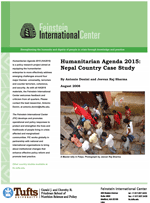This study is the twelfth and final country case study of the “Humanitarian Agenda 2015: Principles, Power and perceptions” (HA2015) research project. As with the other case studies it attempts to capture the “view from below”: it analyzes local perceptions of the four issues of universality, terrorism and counterterrorism, coherence and security of staff in relation to the activities of the humanitarian enterprise in Nepal. At the same time, because of the idiosyncratic nature of the international response to the Nepali crisis, some additional issues are explored. These relate to the role of development agencies in the response to the crisis and more generally to the relationship between development policies and conflict. Another is the impact of conflict on social transformation, particularly in matters relating to discrimination. These two issues are introduced here but will be treated more fully in follow-up research by the Feinstein International Center.
In Nepal, the study’s four themes, and the perceptions of local communities related to them, come together in different ways than the other case studies. This is due mainly to two unique features of the Nepal crisis and the role of the international community in addressing it. The crisis and its solution were fundamentally endogenous processes with limited outside influence or intervention and the aid community was, and is, dominated by development actors and narratives. In Nepal, the humanitarian dimension, which was at the forefront of our eleven other cases studies, is secondary to an already well-established development enterprise. That said, the findings of the Nepal study help illuminate, and are in turn illuminated by, the other contexts examined earlier.







